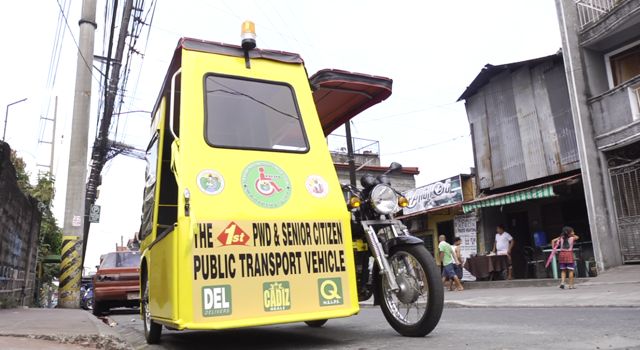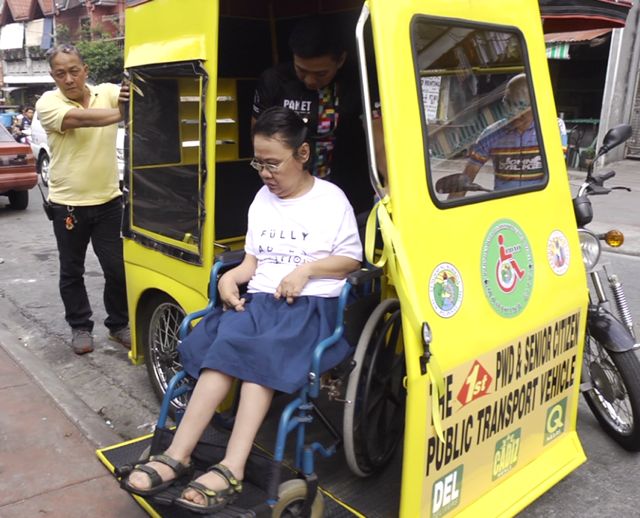SUMMARY
This is AI generated summarization, which may have errors. For context, always refer to the full article.

MANILA, Philippines – In the Philippines, public transportation is not necessarily convenient to everyone. But for the likes of Charito Manglapus, there are worse problems than the faulty trains, overloaded buses, abusive taxi drivers, and paralyzing traffic that Metro Manila commuters encounter every day.
Charito, 61, is a person with disability (PWD). Born with cerebral palsy, the 61-year-old Marikina resident has weak arms and legs. She is practically stuck to her wheelchair.
While she has gotten used to her condition, she has one wish: to be able to watch movies in the cinemas – something not possible because there is no easy way for her to travel from her humble home to the nearest mall in the city.
“I’ve never watched a movie at the mall. Even if I want to go to the mall, I have no means,” she told Rappler in Filipino with a sad smile.
She shared how hard it is for PWDs like her to go around town and enjoy the different amusements it has to offer.
“Sa totoo lang po, hangga’t maaari, ayokong lumalabas ng bahay. Kasi mahirap sa akin ‘yung binubuhat, tapos parang nahihiya ako sa nagbubuhat sa akin,“ she said. (Truth be told, as much as I can help it, I don’t want to go out of the house. Because it’s difficult that someone has to carry me, I’m embarrassed that someone has to carry me.)
But worse, public vehicles more often than not deny her a ride.
“Kapag sa taxi, tinatanggihan kami. May experience po ako na tiningnan ako from head down, tapos sasabihin ay, di po p’wede,” she said. (Taxis refuse to convey us. I experienced a driver looking at me from head to toe, then saying, it’s not possible.)
She couldn’t even help but share an instance when she had to go home from Intramuros in Manila and a taxi driver told her to rent his unit for P500 instead of paying what was on the meter. When taxi drivers ask her to pay what is on the meter, they usually ask for a tip.
“We are not fighting for pity. What we are asking is for them to respect our rights regardless of our disabilities. Because, in a way, we are all equal,” said Charito, a member and former president of the Cerebral Palsy Association of the Philippines.
PWD-friendly trikes
Charito and her fellow PWD have less commuting woes now. On Monday, January 11, the city government of Marikina launched the prototype of a PWD-friendly tricycle – a first of its kind in the Philippines.
“‘Yung public transportation, nakalagay lang naman dun [sa accessibility law] na there should be a priority space for PWDs. Pero ang problema, how can the PWDs avail [themselves] of the priority seats kung di naman sila nakakasakay?” Vice Mayor Jose Cadiz told Rappler in an interview.
(The accessibility law only says public transportation should provide priority space for PWDs. But the problem is, how can PWDs avail themselves of the priority seats when they can’t even get on the vehicle?)

Cadiz, a doctor by profession, designed the simple yet innovative ride, inspired by the PWD-friendly units he saw in developed cities abroad, like Tokyo and Hong Kong.
Compared to an ordinary tricycle, Marikina’s recent innovation has a larger space to accommodate a passenger in a wheelchair and seats up a maximum of 3 companions of the PWD. It also has a ramp to easily draw the passenger into the vehicle.
To ensure safety, the tricycle has straps to secure the wheelchair on board and a siren to alert other vehicles on the road.
For now, the city government only has one unit, which will serve as prototype for the units they intend to produce with the help of the private sector.
“It will be a public-private venture. The government will regulate the operation and the private sector will be the ones to fund it,” Cadiz said.
He also encouraged prospective operators of this project since it will cost less than a regular tricycle.
According to the vice mayor, the unit itself will be P10,000 more than the regular tricycle but the terminal membership fee of P50,000 will not be needed since these units would not be parked in a terminal.
Their office is working on a software, much like the ride-hailing services like Uberand GrabCar, so that PWDs and senior citizens won’t have to travel to terminals and just be picked up from specific points.
PWD-friendly cities
Aside from the re-modeled tricycles, Marikina City is also installing braille tiles along sidewalks of the city hall, health center, and the public market. This is to help PWDs, especially the blind, to walk safely in the city.
Other local government units in Metro Manila have their own initiatives in providing services to the PWDs.
Marikina and Quezon City have their own Persons with Disability Affairs Office (PDAO), while Makati City launched in 2013 its pedestrian lanes specially designated for disabled persons. It also hosted a competition for the city’s most “PWD-friendly” establishments.
In August 2015, Antipolo City launched its free film-viewing program every Monday for disabled persons in the city. – Rappler.com
Add a comment
How does this make you feel?
There are no comments yet. Add your comment to start the conversation.